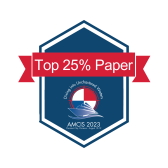Loading...
Paper Type
Complete
Description
The academic community is experiencing a significant disruption thanks to a new technology called ChatGPT. There is news almost daily about how Large Language Models technologies have the potential to allow students to cheat undetected. This leads many universities to discuss ways to regulate and even ban its use. But is this necessary? The previous research focuses mainly on universities' and lecturers' views but fails to consider the students’ views. Do students even want to use the system, and if they do, will they use it for nefarious purposes? Extending the Technology Acceptance Model with Perceived Ethics, this quantitative study researched how students perceive ChatGPT from an ethical perspective and how that impacted their intention to use the system for school work. 277 Students from 40 countries took part in the survey. Results indicated that Perceived Ethics has a direct positive influence on the attitude toward usage but only an indirect effect on the behavioral intention to use the system for school work. This study is one of the first to consider how students perceive ChatGPT from an ethical perspective and how that impacts their perception of and intention to use the Large Language Models technology system.
Paper Number
1753
Recommended Citation
Farrell, Wendy C.; Bogodistov, Yevgen; and Mössenlechner, Claudia, "Is Academic Integrity at Risk? Perceived Ethics and Technology Acceptance of ChatGPT" (2023). AMCIS 2023 Proceedings. 24.
https://aisel.aisnet.org/amcis2023/sig_ed/sig_ed/24
Is Academic Integrity at Risk? Perceived Ethics and Technology Acceptance of ChatGPT
The academic community is experiencing a significant disruption thanks to a new technology called ChatGPT. There is news almost daily about how Large Language Models technologies have the potential to allow students to cheat undetected. This leads many universities to discuss ways to regulate and even ban its use. But is this necessary? The previous research focuses mainly on universities' and lecturers' views but fails to consider the students’ views. Do students even want to use the system, and if they do, will they use it for nefarious purposes? Extending the Technology Acceptance Model with Perceived Ethics, this quantitative study researched how students perceive ChatGPT from an ethical perspective and how that impacted their intention to use the system for school work. 277 Students from 40 countries took part in the survey. Results indicated that Perceived Ethics has a direct positive influence on the attitude toward usage but only an indirect effect on the behavioral intention to use the system for school work. This study is one of the first to consider how students perceive ChatGPT from an ethical perspective and how that impacts their perception of and intention to use the Large Language Models technology system.
When commenting on articles, please be friendly, welcoming, respectful and abide by the AIS eLibrary Discussion Thread Code of Conduct posted here.




Comments
SIG ED